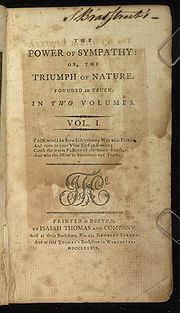
William Hill Brown
Encyclopedia

The Power of Sympathy
The Power of Sympathy: or, The Triumph of Nature is an eighteenth-century American sentimental novel written in epistolary form by William Hill Brown; it is widely considered to be the first American novel. Published by Isaiah Thomas in January 1789, The Power of Sympathy was Brown's first novel...
(1789) and "Harriot, Or The Domestick Reconciliation" as well as the serial essay "The Reformer" published in Isaiah Thomas' Massachusetts Magazine
Massachusetts Magazine
The Massachusetts Magazine was published in Boston, Massachusetts, from 1789 through 1796. Also called the Monthly Museum of Knowledge and Rational Entertainment, it specialized in "poetry, music, biography, history, physics, geography, morality, criticism, philosophy, mathematics, agriculture,...
.
In both, Brown proves an extensive knowledge of European literature for example of Clarissa
Clarissa
Clarissa, or, the History of a Young Lady is an epistolary novel by Samuel Richardson, published in 1748. It tells the tragic story of a heroine whose quest for virtue is continually thwarted by her family, and is the longest real novelA completed work that has been released by a publisher in...
by Samuel Richardson
Samuel Richardson
Samuel Richardson was an 18th-century English writer and printer. He is best known for his three epistolary novels: Pamela: Or, Virtue Rewarded , Clarissa: Or the History of a Young Lady and The History of Sir Charles Grandison...
but tries to lift the American literature from the British corpus by the choice of an American setting.
Biography
William Hill Brown was born in Boston in 1765. Much of his personal history has been left unrecorded: only three examples of his handwriting remain. Two of these examples are simply inscriptions in books. The most telling of the three examples, however, was a letter that Brown wrote to a friend on April 29, 1784. The letter reveals that his appearance reflects that of an "Old Dr. Chauncy," suggesting a small, frail stature. Brown also reveals in his letter that he was victim of a debilitating illness which kept him indoors for approximately four months.Brown also wrote the tragedy West Point Preserved, about the British spy, Major John André
John André
John André was a British army officer hanged as a spy during the American War of Independence. This was due to an incident in which he attempted to assist Benedict Arnold's attempted surrender of the fort at West Point, New York to the British.-Early life:André was born on May 2, 1750 in London to...
.
Brown died in North Carolina in 1793, aged 27.

